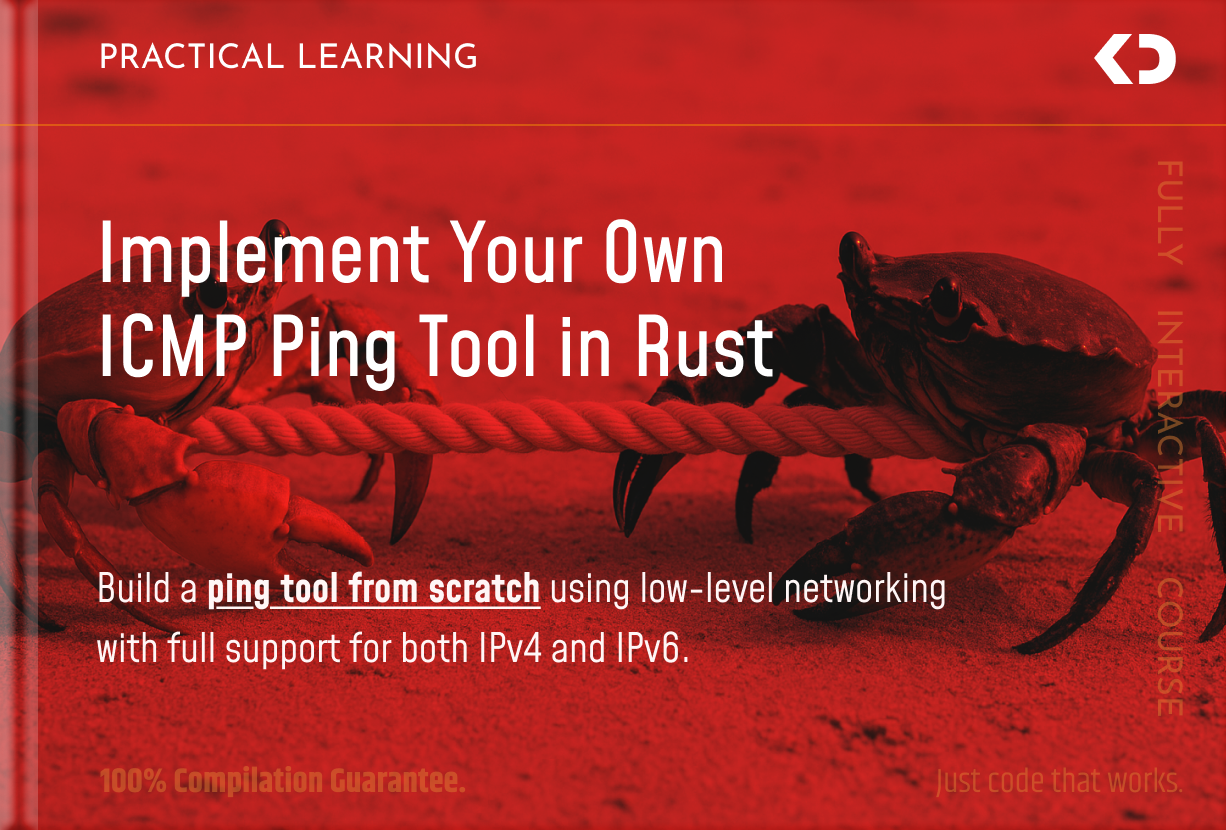
Implement Your Own ICMP Ping Tool in Rust
Master low-level network programming by building your own ping tool from scratch. This project-based course teaches you everything about ICMP protocol implementation, raw socket programming, and cross-platform networking in Rust.
The ping utility is one of the most fundamental network diagnostic tools, yet few developers understand how it actually works under the hood. This course changes that by taking you through a complete implementation that rivals professional tools.
Deep Dive into Network Programming
You'll start with the fundamentals of the ICMP protocol and raw socket programming, then build a complete implementation that supports both IPv4 and IPv6. The course covers all the tricky details that production tools must handle: checksum calculations, proper timeout handling, and cross-platform compatibility.
What You'll Build
Your ping tool will include all the features users expect:
- Support for both IPv4 and IPv6
- Configurable packet size and interval
- Detailed statistics and timing information
- Proper error reporting and diagnostics
- Cross-platform compatibility (Linux, macOS, Windows)
Real-World Networking Skills
The skills you learn apply to many networking projects:
- Network diagnostic tools
- Custom protocol implementations
- Performance monitoring applications
- Security scanning tools
- IoT device communication
Low-Level Rust Programming
This course showcases Rust's capabilities for systems programming:
- Safe handling of unsafe operations
- Zero-copy packet parsing
- Efficient memory management
- Cross-platform abstractions
- Error handling best practices
By the end, you'll have both a useful tool and deep understanding of how network protocols work at the lowest level.
What you'll learn
- Master low-level network programming in Rust
- Understand ICMP protocol internals
- Work with raw sockets and packet crafting
- Implement both IPv4 and IPv6 support
- Handle network timeouts and error conditions
- Create cross-platform networking code
- Parse and validate network packets
- Build command-line tools with proper error handling
Requirements
- Basic Rust programming knowledge
- Understanding of basic networking concepts
- Familiarity with command-line applications
- Basic knowledge of IP protocols
Course Contents
Network Programming Fundamentals
Essential concepts for low-level network programming
- IP Protocol Basics
- ICMP Message Types
- Raw Sockets Overview
- Platform Differences
Setting Up Raw Sockets
Creating and configuring raw sockets for ICMP
- Socket Creation and Configuration
- Privilege Requirements
- Cross-platform Compatibility
- Error Handling Strategies
ICMP Packet Implementation
Building and parsing ICMP packets from scratch
- ICMP Header Structure
- Checksum Calculation
- Packet Serialization
- Timestamp Handling
IPv4 Ping Implementation
Complete IPv4 ping functionality
- IPv4 Header Parsing
- TTL and Fragmentation
- Round-trip Time Calculation
- Statistics Collection
IPv6 Support
Extending support to IPv6 networks
- IPv6 Differences
- ICMPv6 Implementation
- Dual-stack Support
- Address Resolution
Command-line Interface
Building a professional CLI tool
- Argument Parsing
- Output Formatting
- Signal Handling
- Configuration Options
This book includes:
- Step-by-step coding walkthrough
- Complete source code
- Detailed explanations
- Real-world examples
- Raw socket programming
- ICMP protocol implementation
- IPv4 and IPv6 support
- Cross-platform compatibility